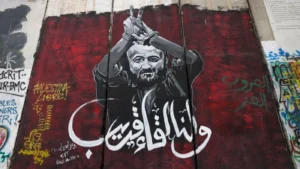Marwan Barghouti: The one figure who could rally Palestinians for a lasting deal

A mural depicts Palestinian prisoner Marwan Barghouti, along Israel’s separation wall in Bethlehem in the occupied West Bank on 24 December 2024
Awni Almashni writes in Middle East Eye on 1 November 2025:
Although theories differ on the role of the individual in shaping history, it was Russian philosopher Georgi Plekhanov who most effectively sought to strike a balance between historical determinism and the influence of individuals on its course.
Today, the case of Marwan Barghouti provides a strong example of that balance, as US President Donald Trump publicly mulls pushing for the jailed Palestinian leader’s release.
Trump’s striking comments have drawn attention to Barghouti’s significance in shaping the contours of the future Palestinian political landscape. Yet the Palestinian people have long recognised Barghouti’s importance, envisioning his rise to a prominent political role.
Barghouti was a candidate in the presidential election won by Mahmoud Abbas two decades ago, but withdrew following advice from his Fatah colleagues. Barghouti also planned to run in the 2021 election, but the vote was cancelled; political analysts say this was largely due to fears within the Palestinian Authority that he would have won.
Trump’s statement could affect how the US engages with the Palestinian question going forward.
Barghouti is far more than a Palestinian prisoner who has spent a third of his life in Israeli jails. Scores of Palestinians have served longer sentences, yet none have occupied the same place in Palestinian political life.
Barghouti has become a symbol of Palestinian unity in a context of overwhelming internal divisions. He has earned broad popular trust through his lifelong service, immense personal sacrifice, and intellectual depth, enabling him to articulate the concept of national liberation within the complexities of the international order.
Striking a balance
Barghouti is principled where principle is needed, pragmatic where possible, and cautious where necessary. He is organised when it matters, and possesses a dialectical mind capable of driving change without rushing the process.
